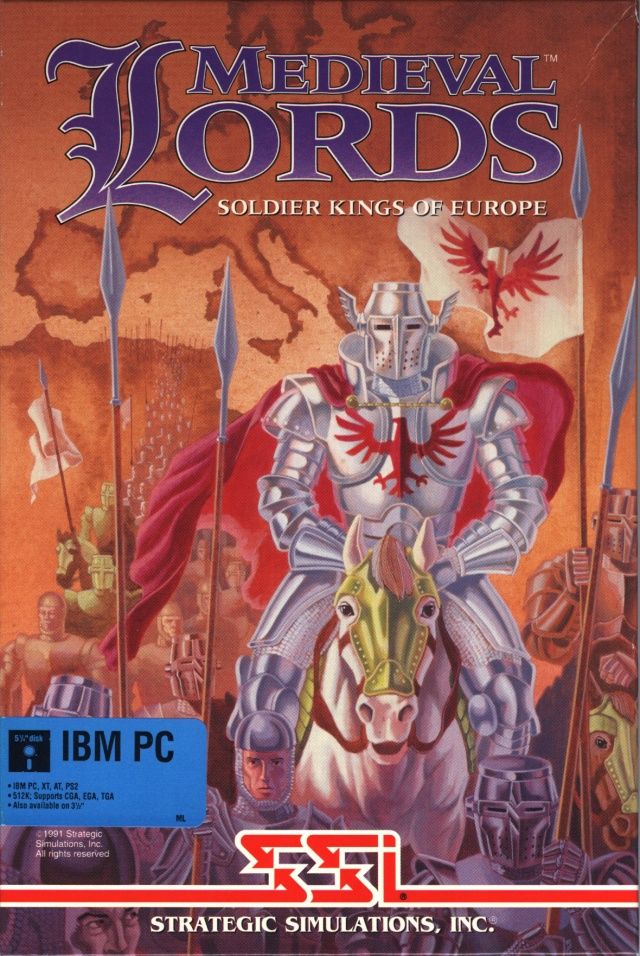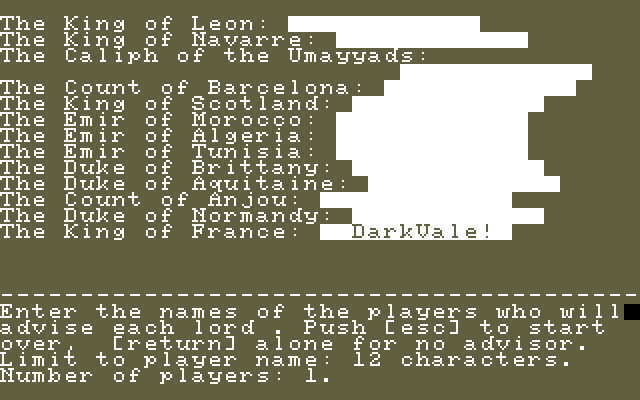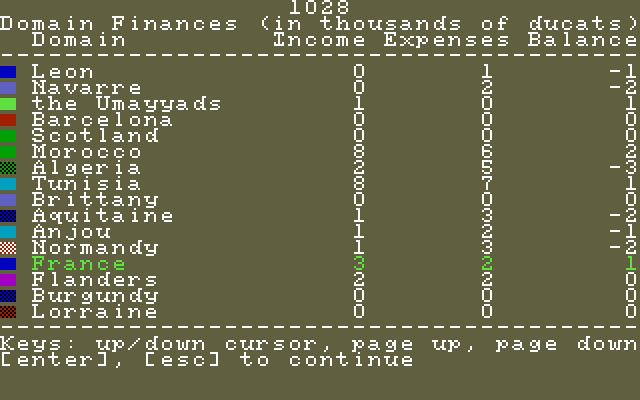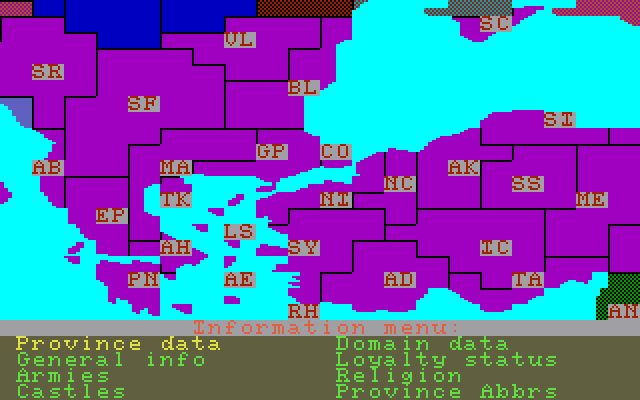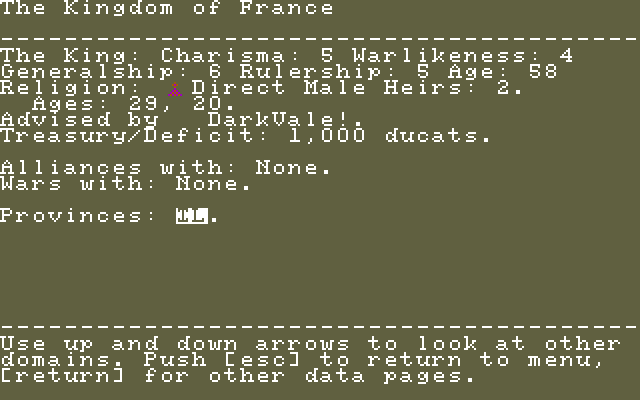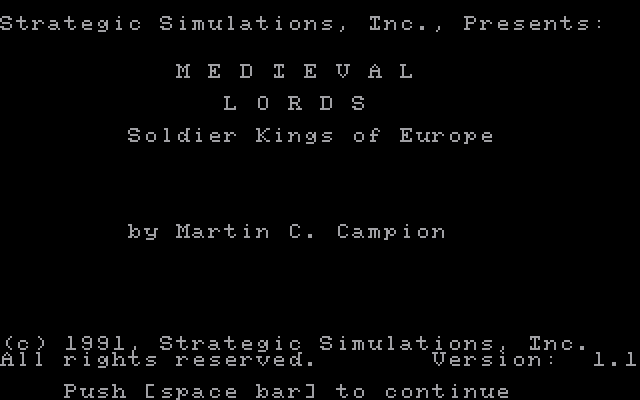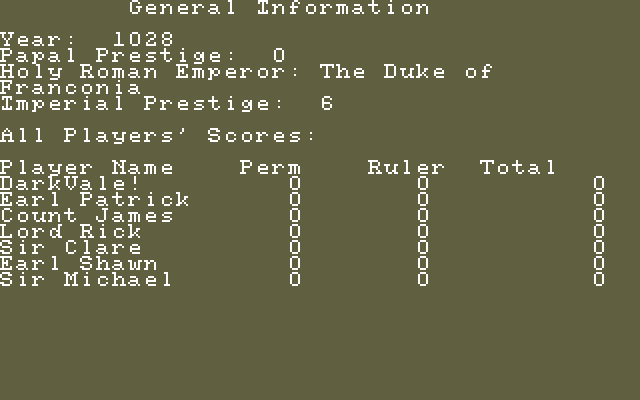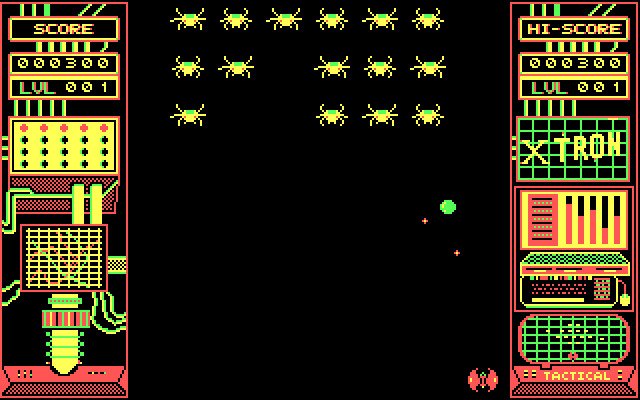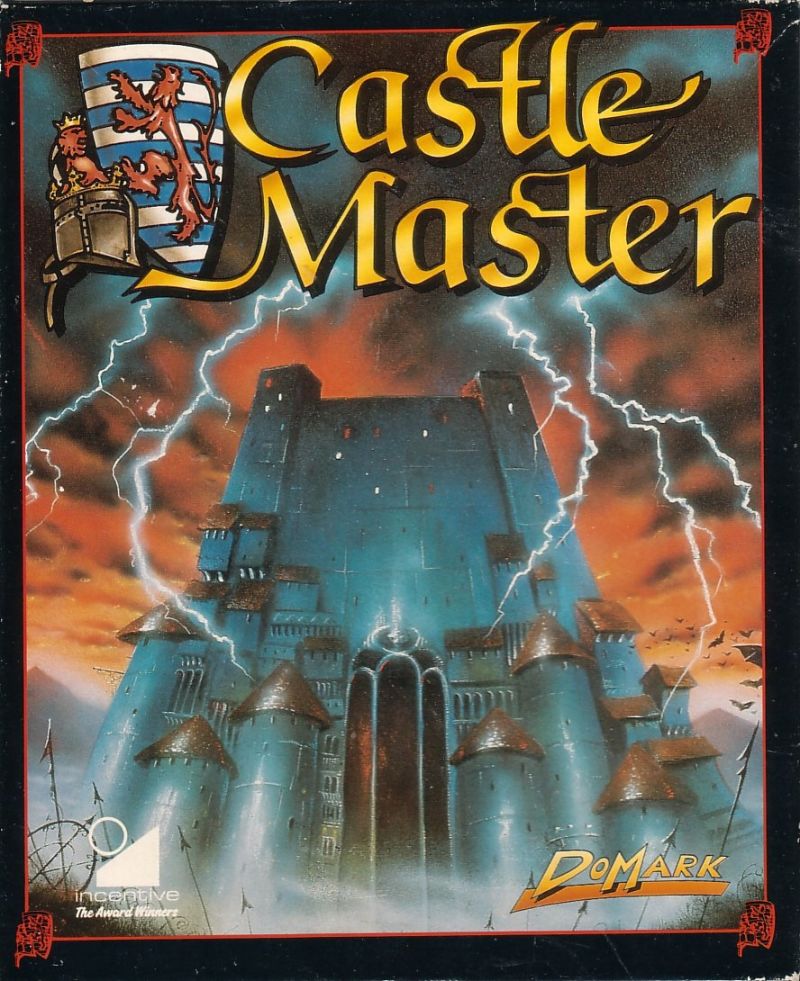
Medieval Lords: Soldier Kings of Europe
Click here to play Medieval Lords: Soldier Kings of Europe onlinePlay Medieval Lords: Soldier Kings of Europe, a very interesting Strategy/Tactics game, developed by Strategic Simulations, Inc. in the year 1991 online on your browser right now.
Medieval Lords: Soldier Kings of Europe description
Attention to all fans of historical strategies! Today you have a unique opportunity to get acquainted with one of them that does not even have a veiled prefix "pseudo". The one where historicity is paramount, where the gameplay is as detailed as possible with minimal graphics. In a word-to touch a real treasure.

Credits 
Options Menu 
Be an immortal advisor and choose a lord to serve! 
Welcome to Medieval Lords! It is the year 1028
Medieval Lords ... However, as you know, during the Middle Ages, the feudal ladder had many titles - from knights to kings, and this is only in Europe. And here, in addition to it, Western Asia is represented along with North Africa, so there will be caliphs, sultans, and many others. Already introduced yourself to a luxurious European castle, the harsh stone walls and a roaring fireplace in the great hall, where songs of minstrels? Or a lavish Oriental Palace with mountains of fruit on a gold tray and a beautiful, dancing to the languid melody?.. If so, then in vain: none of this will be in the game. And not because "the schedule didn't allow". But because all this is supposed to be the same "Lord". And this is not you.

prepare to advise! 
Domain Finance - Check the financial security of your domain and your adversaries! 
Information Menu - Behold the Mighty Empire of Byzantium!
Yes, as paradoxical as it may sound, you are in this game-just the "chief adviser" of the "Lord". A lot depends on you, you can do a lot, your power is great, but it is not absolute. The future of the country is decided by the Lord. By the way, about countries. The game recreates the borders of States in the period from 1028 to 1530 with maximum historical accuracy (it is during this period that the events of the game unfold), there are as many as 159 territories, most of which have rulers.
First, we should say a few words about your Lord - "Lord". At the court of whoever you serve, there are many common features. So, the most important thing is that the "Lord" may not do what you advised him to do, even if it is obvious (for you) that it is necessary to do so and only so. This must be borne in mind: although it does not happen too often, it is still enough to bring an element of randomness to the game. Next, each specific (each!) "Lord" is not a faceless statistician, but a bright personality. Before the game starts, we have a choice of who we want to serve, so we need to study the characteristics of future owners carefully. There are many of them: "charisma", organizational skills, generalship, belligerence, and so on. It is logical that the remake of the Emperor does not work, so better choose the type of their future games (a goal, then you have one – to make your master the Lord of all, but the means of achieving it may be different): if you want to make war, it is better to go to the soldier and not for a peaceful philosopher. "Lords" are not eternal – they die. After the death of the owner, sometimes (if you have the right number of points), you can choose whether to stay to serve his heir or go into service to another (you can even to the worst enemy of the deceased). But it's not as simple as it seems: not the fact that you will be taken, not the fact that it will be better, and so on…
Of course, just because you are not the "most important" person here does not mean that you have few opportunities. On the contrary, there are a lot of opportunities! Medieval Lords is more than just a turn-based strategy game. This is rather a serious and large-scale economic and political medieval simulator of life (but, of course, at its "highest" level-in global terms) with the highest degree of detail.
All available actions can be divided into four large groups.
The first is "internal politics". Here you will have to "maneuver" between the interests of three groups of the population – citizens, feudal nobility and bureaucracy (Yes, there are no peasants (presumably, they are completely disenfranchised), but still this is the only drawback of the game). Each of the population groups has two important indicators that characterize their position: strength (number) and "loyalty" (however, the loyalty of officials is always the maximum). It is logical that it is possible to increase the loyalty of a particular group through certain actions (including bribery), when necessary. Thus, the loyalty of the nobility means a large influx of soldiers into the army and a General strengthening of your troops. While the loyalty of citizens means high rates of paying taxes to the Treasury. And the more officials there are, the more money there is and the less likely there is to be an uprising. And they can be (and citizens and nobles can revolt), and the suppression of the uprising costs money and points, moreover-it can not be suppressed... it is not easy to Bring society to an ideal balance-you need to be a decent schemer for this.
The second is military actions with neighbors. And here again, the principle of "not graphics, but imagination" works. You won't even see the fight properly, but how many features it has (and not only it itself, but also the training)! Not only is there not only an army, but also a Navy, but the army itself consists of completely different elements, and not just the military branches, but the population groups, and each is very different from the other. So, the militia of small feudal lords is well trained and fights well, but these people will almost certainly not participate in the conquests. They have their own small allotments-fiefs, they are ready to protect them to the last drop of blood, but they do not need the" Turkish coast and Africa " at all. Another thing is impoverished knights who boast of noble origin (or, for example, illegitimate children of nobles who do not have their own allotments). These are also excellent warriors, but they have nothing to protect, but they do not even mind going for a "walk" in foreign lands. But-only for the sake of money and land, so you can not count on their loyalty (but they can easily betray or set their own conditions). There are professional mercenaries (but is this true?) soldiers who sell their art for money. They are only concerned about money – they are ready to fight for it both on their own and on someone else's land. They will obey any order without a murmur, they will fight bravely and desperately, but only as long as you pay them. What happens if they don't get paid, you better not even know. There is a personal guard of the "Lord" - the best of all armies: the most noble, the strongest, loyal and loyal fighters, they can be relied on in any situation. Except for one-frequent defeats. The sons of the best families will never lose their honor in captivity and disgrace. And they will not serve an unworthy sovereign or his adviser. So it's not a panacea either. Finally, if you play for a khanate, there will be another type of troops – nomads. But these are generally strange people. They can leave your army at any time without any explanation.
In fact, the battle will not show you: when the armies meet directly, only a lot of numbers are counted, the probability of victory of each side is calculated, and then the result is given (so that is also an element of randomness). If a major battle is won on someone else's land, you can choose whether to plunder this land and go to yourself or try to attach it to the owner's possessions (but then be prepared for an insurgency). If they attacked your land-you can just choose who from where and how much to call for the defense of the province. Of course, troops are also needed to suppress all sorts of internal conflicts, which can have a whole lot of reasons: there are always dissatisfied, alas, even if it seems that everything is good. A separate type of resistance is the presence of heretics (they only appear in Catholic lands by the end of the game). They (heretics) do not usually rise up with weapons, but because of their presence, your master's authority falls, and he can be punished. How is it, you ask, that the master is punished? Yes, because in the game there is still such an important figure as the Pope on his Holy See and a huge army of loyal crusaders…
The third group is "peaceful" foreign policy. It is reduced to making alliances with other States (any Alliance can be broken, but even a neutral country, if it has a ruler, must first officially declare war), but you can refuse. Other countries usually (but not always) do not violate treaties. You can also give gifts to other rulers (and you can give something just like that, or you can not even give in response), you can conduct "subversive activities" on the enemy's lands (for example, to bribe his troops or citizens).
Finally, the fourth and very important part is Finance and budget calculations, in other words, the economy. At the end of each year, the results are summed up, and if the expenses exceed the income (and most often it happens), then you have to look for some way out to stay in your post and generally save your life. You can lie something (but this will make you less respected by all classes), you can raise taxes from citizens, borrow money from feudal lords, reduce the number of the army, or convene a Parliament to effectively govern the country. But all these are dangerous decisions: offended citizens will remember the offense for a long time, feudal lords who gave money can get into virtual slavery, a reduced army can cause defeat in the war, and the Parliament, being once convened (it can only be convened in those countries where it was historically - England, France (States General), Spain (Cortes)), then can not be destroyed in any way, and the Parliament in any case is your enemy (its strength increases with any of your failure).
But this detail does not end there – the game found a place for many historical events that took place and can have an impact on the economy and the balance of power in the world in General. For example, invasions of nomadic peoples from the East or plague epidemics can not be avoided in any way, as well as (by the end of the game) religious wars (but all this, as already noted, plays a role only when you serve the"Lord" -Catholic). The Pope is like a "high Seigneur" for you (by determining the fate of your master), and you should be careful with him: from a kind patron who gives a lot of money for a Crusade to Muslim countries (of which, of course, you never do anything at all...), he can turn into a terrible enemy (if, for example, he learns that you The details do not end there, but it is not necessary to tell further.
Now we should say a few words about what is usually very important for everyone - the schedule. It's here. But, alas, not rich. There is only a map (but very beautiful, bright, multi-colored, with the correct (historically [at least at the beginning of the game]) borders, allowing you to consider every piece of it, and a lot (I would even say - "a lot") slightly dull screens with an abundance of beeches and numbers... And all this will have to delve into: time was severe, one mistake could cost life. And the game is realistic!..
Verdict: not even a Royal gift, but an Imperial gift for all fans of global strategies. One of the most complex and detailed games of all time. An unambiguous hit, recommended for study by everyone for whom the phrase "history of KI" is not just a set of sounds.
Do you want to play Medieval Lords: Soldier Kings of Europe online, in your browser? Now you can. Click here to play Medieval Lords: Soldier Kings of Europe online.
Source: Archive.org, Mobygames.com
Recommended games
Try to play some games from recommended games section.

